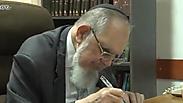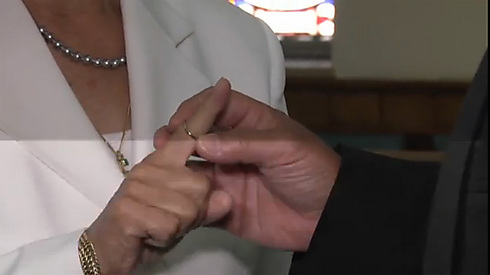
Leading rabbis set up alternative conversion system
Senior Religious Zionism rabbis team up to establish network of courts which will work to convert non-Jewish immigrants from former Soviet Union, hoping public pressure will lead State to change its policy and recognize these conversions.
The Interior Ministry and Chief Rabbinate don't recognize alternative conversions in Israel, even if they are performed under Jewish Law. The move's initiators are hoping that if many converts choose the new route, the public pressure on the Rabbinate will grow, leading to a change in this policy.
Rabbis Yaakov Medan, Re'em Hacohen, Shlomo Riskin, David Stav and others have joined forces under the banner "Giyur Kahalacha" (which means in Hebrew "proper conversion" and also "conversion under Jewish Law"). Together with the ITIM association, the Triguboff Institute and Beit Morasha, which are active in this field, they are promising potential converts a friendly procedure and the adoption of lenient halachic methods.
The move is supported by the Jewish Agency for Israel, and the new courts will be headed by Rabbi Nahum Eliezer Rabinovitch, one of the leaders of Religious Zionism.

"The ingathering of the exiles and the great immigration from the former Soviet Union pose considerable challenges to the State of Israel, which require responsible and brave decisions from the people's leaders, both on the halachic-rabbinical level and on the national level," the Giyur Kahalacha rabbis said in a statement explaining the need for the establishment of alternative courts.
"Our moral responsibility is to ensure the absorption and full integration of the immigrants, for their sake and for the continuation of the Jewish people."
There are already several courts operated in Israel by different religious circles, which convert people under Jewish Law, but these converts are not recognized by the State as Jews. The High Court of Justice is currently discussing a petition filed by converts from the court of Rabbi Nissim Karelitz, one of the leaders of the ultra-Orthodox public, who are demanding recognition of their religious conversion.
Jewish Agency Chairman Natan Sharansky welcomed the establishment of independent rabbinical courts to conduct conversions in Israel on Monday, saying: "We all wish to continue the process of ingathering the exiles from throughout the world in an era of lost identities and growing assimilation.
"In order to keep the gates of Israel open to all who wish to join our people in accordance with Halacha, it is important that rabbis who have been authorized by the Chief Rabbinate to conduct conversions participate in this process, and this new initiative will enable them to do so."
The canceled conversion reform
Tensions have been growing recently between the liberal circles of Religious Zionism and the Chief Rabbinate, after members of the Rabbinate Council threatened not to extend the term of Rabbi Shlomo Riskin, the chief rabbi of the settlement of Efrat, due to his views on issues like conversion and women's enlistment for IDF service. His term was eventually extended after the Chief Rabbinate's legal advisor ruled that the Rabbinate Council was unauthorized to cut it short.
The "conversion reform" was one of the banners raised by the previous government, but it was canceled upon the formation of the current government, and the control of all conversion procedures recognized by the State's authorities was handed over to the haredim.
The "conversion law," which was initiated by former Knesset Member Elazar Stern and advanced by former Justice Minister Tzipi Livni, handed conversion authorities over to city rabbis in order to allow an easier conversion in a simpler process across the country.
According to Stern and Livni's proposal, every city rabbi would be permitted to appoint a panel of religious judges and convert any non-Jew who seeks to convert to Judaism. Until that reform, the conversion authority was held exclusively by special courts subject to the Ministry of Religious Services and the Chief Rabbinate.
According to an alternative approved about a month ago, the new courts will act "under Jewish Law" as part of the state conversion system. The panel heads will only be appointed by the Chief Rabbinate, following a recommendation from the president of the High Rabbinical Court (a position held today by Chief Sephardic Rabbi Yitzhak Yosef) and two incumbent conversion judges.










